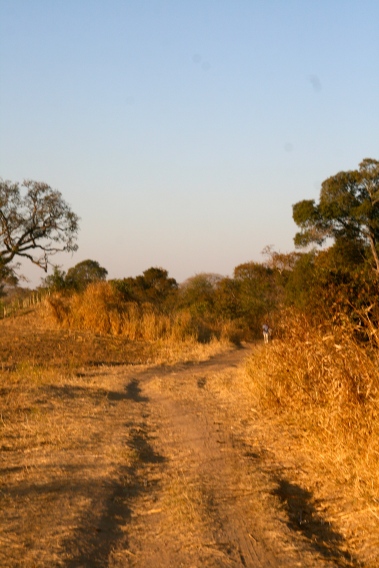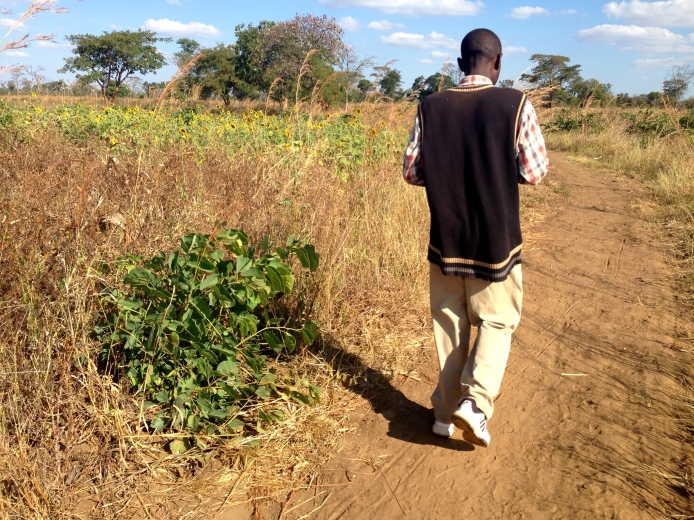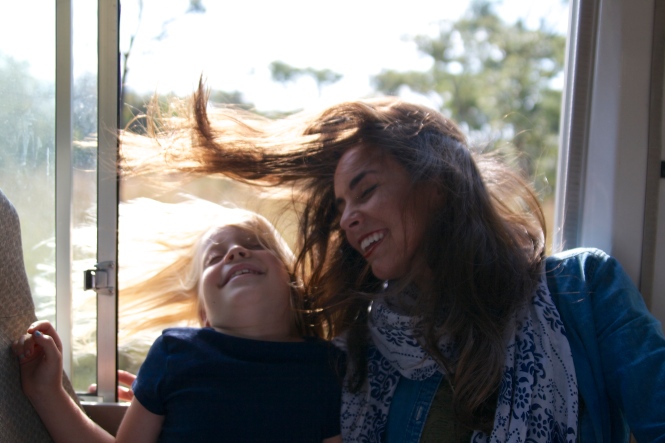I took a 2-hour flight from Lusaka to Johannesburg, 11-hour flight to London, and then hopped on a 9-hour flight that finally carried me home to the great state of Georgia about a week ago. I wobbled and swayed under the weight of too many bags (see if you can find all 5 in the picture) as I stumbled out of the Hartsfield-Jackson baggage claim. I was greeted with warm embraces and the familiar humidity of the South, and I was happy to be home. I had missed my family, I had missed my boyfriend, and I had missed my town. I was ready for familiar food and my own comfy bed. But I would soon come to realize that spending 6 weeks in a foreign culture has some strange effects on your former understanding of “familiar.”
The first wave of shock came when I stepped through the church doors Sunday morning. I entered into our air-conditioned building with its big comfy chairs and walls with sleek paint jobs. Sultry waves of smoke contrasted the psychedelic spectrum of lights flooding through the darkness. I took my typical place with my family in a balcony aisle, and felt my chest harden with a growing sense of alienation.
My palms began to sweat; panic. I felt closed-off, separated. I peeked around and saw people politely standing, singing praises to God, a melody of voices filling the atmosphere. “My chains are gone, I’ve been set free…” but as I watched the familiar people, and heard the familiar tune, confusion nevertheless, chocked me.
Freedom? Freedom… I remember what freedom looks like. My heart swam back through the sleepy days and the long plane rides, back to the Zambian outback on similar Sunday mornings. People were dancing and swaying and singing in my mind. I could see their smiling faces and hear their rich laughter and feel the weightlessness of their praise. Yes, I remember worship in Zambia. And I felt a heaviness seep over my heart. And that’s when the tears started.
Loving voices soon surrounded me. “How was your trip? I bet it was an amazing experience! What was the best part?” And even as I stood there trying to speak, I was utterly speechless. I tried to fill my mouth with words, but all that came was an overwhelming feeling of loss. How can I explain it to you? “I… it……… was an incredible experience,” was all that would pitifully tumble out. I would go off about the sightseeing or the New Day kids and how brilliant they were. I tried to give reassuring facial expressions, and everyone would always give an empathetic smile, and I would struggle to turn the conversation back around on them. No one ever really noticed. But as they launched off on everything they’d been doing that summer, I felt like I was watching a TV screen in front of me. I didn’t feel present, and the truth was, I wasn’t. I was slowly coming to realize a pretty sizeable chunk of my heart was still racing around the plains of Africa. How do you explain that to people? How can I make you understand everything that happened in that place? How can I tell you about holding those beautiful children in my arms or what it felt like to worship in another language or to see the grace of God spill out in torrents over people I’ll never see again in my life? How are there words for things like that?
Thus the feeling of panic. Thus the feeling of displacement.
I struggled through conversations in and out of that first day. I finally got home, and slowly climbed the stairs to my room. I pulled open my creaky closet door, melted down to a fetal position under my hundreds of shirts and pants and dresses and skirts, and wept. And wept.
You’ve probably heard of reverse culture shock. I had once or twice. But it still didn’t make sense. I felt like a perfect stranger in a place I had called home for almost 22 years. I wasn’t prepared for the bewilderment. I wasn’t ready for the shock of American culture. Everything was the same, so what had changed?
The problem wasn’t that my little hometown had changed, but that I had. I sat there in my closet that day, staring up at all my clothes. It was utterly overwhelming. Back in Zambia, I was accustomed to wearing the same two skirts and the same athletic pants every single day. And compared to most Zambian women, even that was an abundance of clothing. And the truth was, it wasn’t hard. I loved it. I don’t need all the clothes I have in America. And forget clothing: my room is LITTERED with things I don’t need. Mostly just for comfort. Mostly for security. Mostly because I never knew. I didn’t know.
Here I am a week later, and I’ve come to better terms with the onslaught of feelings. I make conversation about Africa without tearing up, as a matter of fact, I’m speaking to a youth group tomorrow about some of the things I learned while I was over there. But it took some patience to get to this point. And the fact remains that the ugly, panic-inducing, gut-wrenching feeling everyone has coined as “reverse culture shock” actually is a legitimate thing that takes a lot of prayer and intentionality to work through.
I’ve written several pieces that I will post this week attempting to voice some of thoughts for which I couldn’t find words a week ago. They’re about things that I don’t want to forget; things I shouldn’t forget. But for now, the biggest thing that I want to note that has helped me work through the culture shock is knowing that the same faithful God Who called me with a purpose to Zambia is the same God Who called me back to America. If He really is Who I believe Him to be, then regardless of my emotions, I know He hasn’t left me. I know that He has a purpose and a plan for my life. I used to struggle with thinking I would miss that one big purpose, but I’ve come realize our purpose in life isn’t one big event that we’re climbing towards. Our purpose here on earth is to love God and love people while we’re here on this earth. However we can, wherever we can, whatever it costs us personally. When God is the One setting the vision of our hearts, we’re not missing Him. He’s dwelling there with us. This is transcendence, this is peace: I want nothing but Your presence, God. I am filled. Wherever I am.














